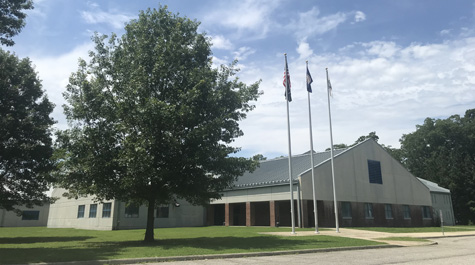Counseling students empower inmates to overcome addiction
Every Friday this past spring, four William & Mary master’s degree students in counseling traveled to the Virginia Peninsula Regional Jail to spend the morning with a group of women inmates who were working to overcome substance use disorders. Through a partnership between William & Mary’s School of Education and the jail, the students designed and delivered a 10-week counseling curriculum focused on empowering and motivating the women to find a path toward a healthier life.
The counseling sessions were one component of a new initiative at the jail called We Are In This Together, or WAITT. Inmates apply to the intensive behavioral modification program, which offers 40 hours per week of programming designed to reduce recidivism and help inmates transition back into the community on a path to recovery. The evidence-based counseling treatment provided by the then-William & Mary students was an important part of this work.
Tony Pham ’95, a former assistant commonwealth’s attorney, is now the superintendent of the jail and initiated the program this spring.
“The William & Mary counseling students provided such an invaluable service to the program participants,” he said. “They provided knowledge about how to create healthy relationships within the confines of proper boundaries, as well as how to address emotions and recognize negative triggers. In helping the participants recognize these feelings, the program provided a path forward.”
 Madeline Vann M.Ed. ’19, whose degree is in family counseling, was the driving force behind W&M’s involvement in the program.
Madeline Vann M.Ed. ’19, whose degree is in family counseling, was the driving force behind W&M’s involvement in the program.
“Maddie had a heart for working with this community and she put her heart into action,” said Daniel Gutierrez, assistant professor of counseling and faculty supervisor for the program. “I think this is a testament to the quality of our counseling students and the difference they can make when they set their minds to it.”
Vann was attracted to the work the jail was doing to help women not only tackle their substance use disorder but also to provide education on issues such as trauma, parenting, relationships, civic engagement, housing, GED preparation and spiritual growth as part of a larger initiative to promote healthy outcomes for inmates. “When we work with women on their recovery in a comprehensive way, we can have a tremendous positive ripple effect through the entire system of their families and communities.”
Vann recruited fellow student Lauren Reckling M.Ed. ’19, a second-year in the addictions counseling program, to help her develop the group counseling curriculum they would use over the course of the program. The curriculum centered around motivational interviewing, which is the model used at New Leaf Clinic, the on-campus substance abuse clinic where both students have interned.
“Motivational interviewing is about meeting the client where they are, joining them on the journey of their lives and helping them find the motivation and path to change,” said Reckling.
The students found the inmates at the jail to be enthusiastic and engaged participants in this work.
“They had to apply to the program, so they’d already shown initiative and demonstrated that they wanted to make a change in their lives,” said Reckling. “We found that they were really hungry for this kind of experience — ready to learn and very open to new experiences. It was inspiring.”
Vann and Reckling were joined by two additional students, Allison Dukes and Sarah Taylor, both first-year master’s students in family counseling, to conduct the group sessions. Dukes and Taylor will take the reins in leading the program next year.
For all of the students, the experience was deeply impactful.
“I think I took away some major life lessons,” said Dukes. “It’s so quick for us to generalize inmates in regards to their pasts, and this experience taught me that ‘inmate’ is not, and never should be, someone’s sole, primary characteristic.”
The WAITT participants all had histories of substance use and they ranged in age from early 20s to late 50s. Many were mothers or grandmothers, and the students quickly discovered that their children were an important motivating factor for the women.
“Throughout the sessions, the women were intensely aware of their families and those connections. They wanted to make changes for their kids and grandkids,” Reckling said.
Providing group counseling in a jail was not without its share of challenges. Jails are noisy, busy places, and disruptions were inevitable. The students had to carefully balance best practices in counseling and client confidentiality while remaining responsible to jail protocols and security concerns.
Looking ahead, Dukes and Taylor plan to build on this year’s successes when the program resumes in the fall.
“My hopes for the next year include integrating trauma-informed mindfulness practices for the women to use on their own outside of sessions, which will help them develop healthy coping practices when faced with potential triggers from their past,” Dukes said. “I hope that we and our curriculum can have as much of an impact as Lauren and Maddie did this year.”
To Gutierrez, this kind of experience is critical to the education of future counselors.
“Counselors in training must be aware of those that society has pushed to the margins,” he said. “It’s so important for our students to get an opportunity to meet and connect with the human beings in those settings, so that they grow and learn how to best help those who are most needy among us.”
Learn more about the WAITT program and participants in this recent story from the WYDaily.
















